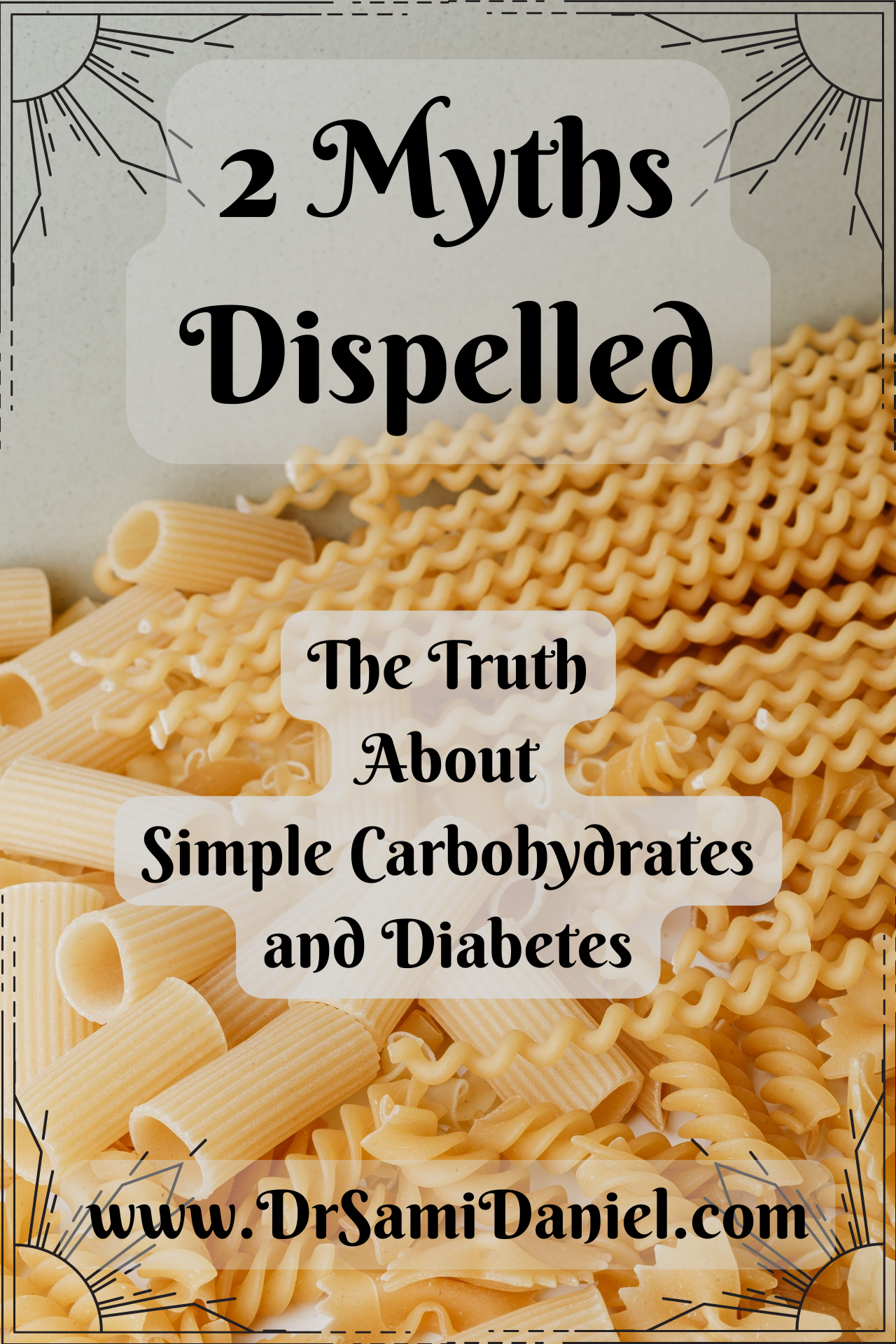2 Myths Dispelled: The Truth About Simple Carbohydrates and Diabetes
If you think about it, simple carbohydrates are like playdough.
You can mold it into any shape you desire. You can create the soft, fluffy texture of white bread, the crisp crunch of a potato chip, or freeze it into a cool summer treat. It’s quite fun and very messy!
We all have fond childhood memories of being in the kitchen with our grandmothers and mothers making bread, cake, or pie, right? Licking the batter was always a special treat!
Alas, we grew up; and we discovered this bizarre concept called “health”?
Suddenly we were told that we have to look after our health as if it were our only child. And somehow, simple carbohydrates are the demon spawn poised to attack if we ever let our guard down.
Umm… What?!
Sprinkle in some self-doubt about body image; and presto chango – we have a warped and conflicted relationship with food.
That’s messed up!
Let’s make things right.
Let’s Dispel 2 Myths
First, simple carbohydrates are NOT the demon spawn.
Second, simple carbohydrates will NOT destroy your health.
Here’s the truth as I currently know it:
Simple carbohydrates, particularly refined sugars, CAN have a negative impact on our bodies IF we consume too much for a long time.
So that introduces three questions:
- How negative are the negative impacts?
- How much is too much?
- How long is a long time?
Does anyone actually answer these questions for us? Not really.
We get arbitrary answers designed to reach the general public. Then we are told to speak with our doctors for more personalized medical information.
Ok, that makes sense. After all, we cannot expect a public service announcement to give personal medical advice to millions of people at the same time.
Also, millions of people say a million different things. So I would personally prefer speaking with my doctor for credible information.
So we faithfully go to our doctor.
How the Body Handles Carbohydrates
Eating food will spike your blood sugar. Simple carbohydrates will have a greater impact.
Your pancreas is the organ that controls your blood sugar with a hormone called insulin.
- Your blood sugar goes up when you eat.
- Then your pancreas uses insulin to unlock special doors throughout the body.
- When the doors open, the sugar can pass from the blood into muscles and organs.
- So the sugars in your blood return to a normal level.
Everything is working perfectly!
How Things Go Sideways
Very slowly, over many years.
Your body naturally goes through those 4 steps to handle blood sugars at every meal.
But what happens when you also have a snack in between meals? Or when you add sugar to that cup of coffee? What about that quick pick-me-up during the mid-afternoon slump?
The cycle repeats!
Every time the cycle repeats, the influx of sugar goes into the bloodstream and gets delivered to your muscles, brain, and other organs.
Repeating this cycle too often is like getting a bad sunburn versus a nice tan.
Your organs get tired of insulin. It’s like hearing someone tell you the same story for the umpteenth time. Eventually you just tune it out.
- So if your organs stop listening to insulin, the doors don’t open as easily.
- If the doors don’t open as easily, the sugar builds up in the blood.
- If the sugar builds up in the blood, the pancreas makes MORE insulin to open the doors more forcefully.
This is like the person telling the story, for the umpteenth time, noticed that you’re not engaged. So their solution is to tell their story LOUDER.
Then you might respond by using ear plugs. Then they will talk even louder. Then you will use noise-canceling headphones.
This vicious cycle continues until either the speaker is burned out from speaking louder than normal, or you become deaf and unable to hear new stories or warning signs.
How Negative are the Negative Impacts?
Many problems start happening if blood sugar is always high.
These problems tend to center around cardiovascular health.
The cardiovascular system is the only delivery system of blood to every part of the body.
With a robust cardiovascular system, your body enjoys efficient delivery of oxygen and nutrients. This system is WAY better than Amazon Prime 2-day shipping.
However the roads and air strips break down with heavy traffic and poor maintenance.
Consistently high blood sugar creates excess traffic. The natural repair mechanisms of the body cannot keep up with the extra load.
So the blood vessels break down faster than they can be repaired.
If blood vessels break down, we need to patch things up. The patches themselves can build up into roadblocks if things are not properly repaired.
If there are road blocks, the couriers (the red blood cells) cannot deliver their vitally important packages of oxygen and nutrients.
This leads to complications.
A roadblock in the brain causes a stroke.
A roadblock in the heart causes a heart attack.
Roadblocks in the kidneys can cause kidney failure.
Roadblocks in the eyes can lead to vision changes and blindness.
A roadblock in the penis can lead to erectile dysfunction (THIS gets a man to visit his doctor. Gentlemen, you don’t need viagra; you need diabetic control).
Furthermore, roadblocks prevent our immune system from going where they need to go.
This means wounds will not heal as quickly. This also means foreign invaders have a golden opportunity to gain a foothold and lead to life-threatening infections.
How Much is Too Much?
Nobody can tell you except for your own body.
Your blood sugar should rise within 1 hour of eating; then it should return to normal within 2 hours after eating.1
What is normal fasting blood sugar? Usually between 80-120 mg/dL.1
If you have not eaten or drank anything for at least 2 hours and your blood sugar is still above 126 mg/dL, that is a sign you may have diabetes. So speak with your doctor about testing for diabetes.1
How Long is a Long Time?
Diabetes is a disease that develops over years.
Some people might take more years; some people might take fewer years.
Type 2 diabetes has a genetic component.2 So if your family contends with diabetes, you should be vigilant and speak with your doctor consistently.
Type 1 diabetes can happen in children.2 People are born with a pancreas that does not work. So diabetes happens rapidly.
The Playdough Effect
Despite the complications of diabetes, everybody must understand that simple carbohydrates are nothing to be feared. We must simply consider the balance of our diet.
However many people do not realize that the balance of foods in a grocery store does not match the balance of foods needed for our health.
Take a stroll down any grocery store aisle and you’ll find simple carbohydrates hiding in plain sight.
They’re in the obvious places, like desserts, candy bars, soft drinks, breads, and pastas.
I was surprised to discover added sugars in products that make no sense!
I admit that I never looked at peanut butter the same way again. I immediately tasted the difference the moment I switched to a brand with the only ingredient required: peanuts and salt.
I also found added sugars in my salad dressings. I dare you to find a dressing in the market without added sugar. I could not find anything! So I made my own simple version with lemon juice, olive oil, and a little cayenne powder because I love heat.
My point is this:
Simple carbohydrates can be found everywhere. Since they can be found everywhere, we are not always aware of how much we are eating. If we are not always aware, then we have lost awareness of our dietary balance.
We need to restore the balance of foods we eat; and we start with developing our awareness of the foods we eat.
This is common knowledge:
Read ingredient labels carefully and look for products that are low in added sugars and high in fiber. Choose whole grains over refined white flour, and opt for fresh fruits and vegetables over processed snacks.
Wisdom comes with the experience of practice. So go practice reading nutrition facts and ingredient lists.
Build self-awareness in a box; you will integrate that food into your being soon.
Conclusion
- Don’t fear simple carbohydrates.
- Do build awareness of where to find them and what shapes they can embody.
- Do build a diet centered on balance.
- Do check in with your body to see if all systems are functioning well.
- Do speak with your doctor with any concerns.
Leave a comment and subscribe to my newsletter below!
Thank you for reading!







